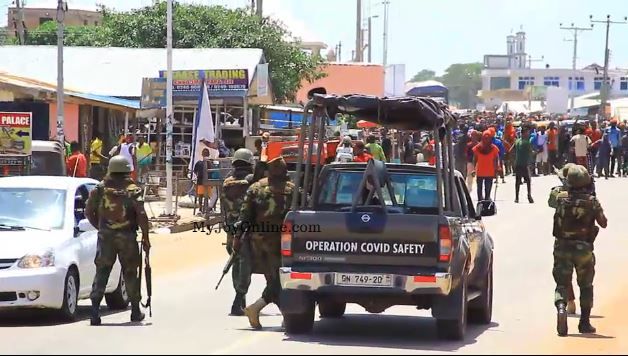
Audio By Carbonatix
Security analyst, Emmanuel Bombande, says had it not been for the military intervention in the Ejura riot, the shootings which claimed the lives of two rioters would not have occurred.
According to him, the police were doing a good job managing the situation “until the military started jumping out of their pickups.”
“It was when the military started intervening that we then saw the shootings that then led to the killing of these two people. That should tell us a lot,” he said.
He says this recent incident is enough reason to justify why the military should be prevented from engaging with civilians in crowd control and other policing duties.
“We should not be involving the military in policing duties. The military should not be seen trying to engage in matters of crowd control and the other incidences that have occurred to bring us into the type of conversation that we are having this morning,” he said on the AM Show on JoyNews.
“But in the overall, I totally agree that we should have less of the army involved with civilians in managing what we are generally describing as to whether it is crime control, whether it is curbing crime and you name it… it is basically to say that the military belongs to the barracks and their duties are to ensure that the territorial integrity of Ghana is well preserved and well-defended,” he added.
Mr Bombande, however, stated that the military can be brought in for policing duties under extraordinary conditions, most often when the Ghana Police Service do not have enough personnel to carry out the operation.
He stated that even under such conditions, the military should not be allowed to operate on their own accord as was witnessed in Ejura, but should be made subservient to the direction of the Police in command of the operation.
He said, “I, however, admit that on specialized duties, for example in the organization of elections, because the number of men and women in the Ghana Police Service will often be insufficient you want joint operations that bring in the other security agencies to participate, but always with the understanding that it is the police that has the command and that the other agencies, particularly the military submit themselves to the command and rules of procedure of the police. But these would be very rare in my view.
“Another example will be when the level of crime becomes elevated to the point that the police alone are struggling to bring down the incidences of crime, you might want to have a specialized operation that brings in the army to play a role, but again strictly under the direction of the police.”
Latest Stories
-
Ghana is rising again – Mahama declares
5 hours -
Firefighters subdue blaze at Accra’s Tudu, officials warn of busy fire season ahead
5 hours -
New Year’s Luv FM Family Party in the park ends in grand style at Rattray park
5 hours -
Mahama targets digital schools, universal healthcare, and food self-sufficiency in 2026
5 hours -
Ghana’s global image boosted by our world-acclaimed reset agenda – Mahama
6 hours -
Full text: Mahama’s New Year message to the nation
6 hours -
The foundation is laid; now we accelerate and expand in 2026 – Mahama
6 hours -
There is no NPP, CPP nor NDC Ghana, only one Ghana – Mahama
6 hours -
Eduwatch praises education financing gains but warns delays, teacher gaps could derail reforms
6 hours -
Kusaal Wikimedians take local language online in 14-day digital campaign
7 hours -
Stop interfering in each other’s roles – Bole-Bamboi MP appeals to traditional rulers for peace
7 hours -
Playback: President Mahama addresses the nation in New Year message
8 hours -
Industrial and Commercial Workers’ Union call for strong work ethics, economic participation in 2026 new year message
10 hours -
Crossover Joy: Churches in Ghana welcome 2026 with fire and faith
10 hours -
Traffic chaos on Accra–Kumasi Highway leaves hundreds stranded as diversions gridlock
10 hours

